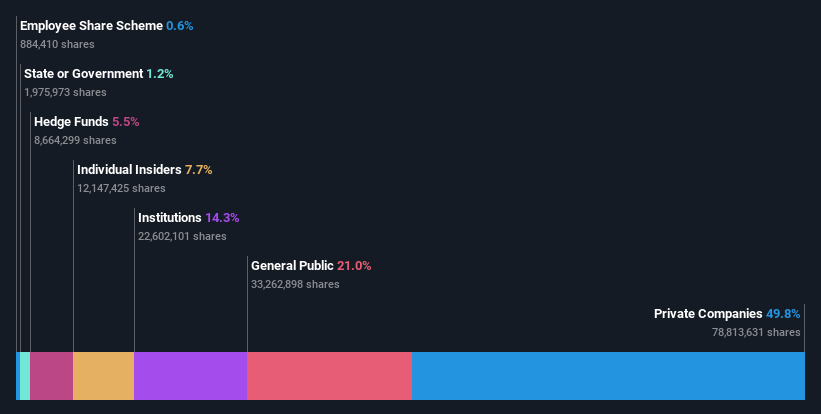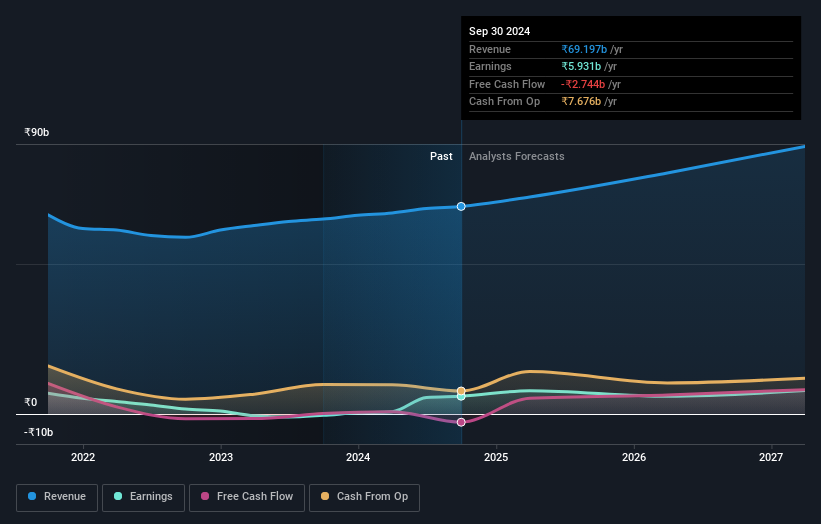Private companies are Jubilant Pharmova Limited's (NSE:JUBLPHARMA) biggest owners and were hit after market cap dropped ₹13b

Key Insights
- The considerable ownership by private companies in Jubilant Pharmova indicates that they collectively have a greater say in management and business strategy
- A total of 4 investors have a majority stake in the company with 52% ownership
- Institutions own 14% of Jubilant Pharmova
A look at the shareholders of Jubilant Pharmova Limited (NSE:JUBLPHARMA) can tell us which group is most powerful. We can see that private companies own the lion's share in the company with 50% ownership. That is, the group stands to benefit the most if the stock rises (or lose the most if there is a downturn).
And last week, private companies endured the biggest losses as the stock fell by 7.3%.
Let's delve deeper into each type of owner of Jubilant Pharmova, beginning with the chart below.
Check out our latest analysis for Jubilant Pharmova

What Does The Institutional Ownership Tell Us About Jubilant Pharmova?
Many institutions measure their performance against an index that approximates the local market. So they usually pay more attention to companies that are included in major indices.
As you can see, institutional investors have a fair amount of stake in Jubilant Pharmova. This implies the analysts working for those institutions have looked at the stock and they like it. But just like anyone else, they could be wrong. If multiple institutions change their view on a stock at the same time, you could see the share price drop fast. It's therefore worth looking at Jubilant Pharmova's earnings history below. Of course, the future is what really matters.

It looks like hedge funds own 5.5% of Jubilant Pharmova shares. That's interesting, because hedge funds can be quite active and activist. Many look for medium term catalysts that will drive the share price higher. The company's largest shareholder is Shyam Sunder Bhartia Family Trust, with ownership of 21%. In comparison, the second and third largest shareholders hold about 19% and 6.5% of the stock. Additionally, the company's CEO Priyavrat Bhartia directly holds 0.9% of the total shares outstanding.
On looking further, we found that 52% of the shares are owned by the top 4 shareholders. In other words, these shareholders have a meaningful say in the decisions of the company.
While it makes sense to study institutional ownership data for a company, it also makes sense to study analyst sentiments to know which way the wind is blowing. There is some analyst coverage of the stock, but it could still become more well known, with time.
Insider Ownership Of Jubilant Pharmova
While the precise definition of an insider can be subjective, almost everyone considers board members to be insiders. The company management answer to the board and the latter should represent the interests of shareholders. Notably, sometimes top-level managers are on the board themselves.
I generally consider insider ownership to be a good thing. However, on some occasions it makes it more difficult for other shareholders to hold the board accountable for decisions.
Shareholders would probably be interested to learn that insiders own shares in Jubilant Pharmova Limited. This is a big company, so it is good to see this level of alignment. Insiders own ₹12b worth of shares (at current prices). Most would say this shows alignment of interests between shareholders and the board. Still, it might be worth checking if those insiders have been selling.
General Public Ownership
With a 21% ownership, the general public, mostly comprising of individual investors, have some degree of sway over Jubilant Pharmova. This size of ownership, while considerable, may not be enough to change company policy if the decision is not in sync with other large shareholders.
Private Company Ownership
Our data indicates that Private Companies hold 50%, of the company's shares. Private companies may be related parties. Sometimes insiders have an interest in a public company through a holding in a private company, rather than in their own capacity as an individual. While it's hard to draw any broad stroke conclusions, it is worth noting as an area for further research.
Next Steps:
It's always worth thinking about the different groups who own shares in a company. But to understand Jubilant Pharmova better, we need to consider many other factors. Case in point: We've spotted 2 warning signs for Jubilant Pharmova you should be aware of, and 1 of them is concerning.
If you are like me, you may want to think about whether this company will grow or shrink. Luckily, you can check this free report showing analyst forecasts for its future.
NB: Figures in this article are calculated using data from the last twelve months, which refer to the 12-month period ending on the last date of the month the financial statement is dated. This may not be consistent with full year annual report figures.
New: Manage All Your Stock Portfolios in One Place
We've created the ultimate portfolio companion for stock investors, and it's free.
• Connect an unlimited number of Portfolios and see your total in one currency
• Be alerted to new Warning Signs or Risks via email or mobile
• Track the Fair Value of your stocks
Have feedback on this article? Concerned about the content? Get in touch with us directly. Alternatively, email editorial-team (at) simplywallst.com.
This article by Simply Wall St is general in nature. We provide commentary based on historical data and analyst forecasts only using an unbiased methodology and our articles are not intended to be financial advice. It does not constitute a recommendation to buy or sell any stock, and does not take account of your objectives, or your financial situation. We aim to bring you long-term focused analysis driven by fundamental data. Note that our analysis may not factor in the latest price-sensitive company announcements or qualitative material. Simply Wall St has no position in any stocks mentioned.
About NSEI:JUBLPHARMA
Jubilant Pharmova
Operates as an integrated pharmaceutical company in India, the Americas, Europe, and internationally.
Good value with adequate balance sheet.


